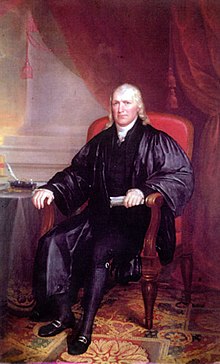This is the first of a two part series on Hamilton’s interactions with General Charles Lee. Look out for part two next week!
The University of Virginia’s Washington Papers gives this background of the Battle of Monmouth:
On 28 June 1778 the British and American forces engaged near Monmouth, New Jersey. The battle occurred when Maj. Gen. Charles Lee retreated unexpectedly after briefly engaging with the British as the British removed themselves from the village of Monmouth Courthouse. When Lee’s troops retreated towards the main body of the American forces, the British troops under Gen. Sir Henry Clinton followed close behind. Despite the great confusion resulting from the unexpected retreat, the American forces repelled the British advances. The events surrounding Lee’s retreat and Washington’s reaction to that retreat precipitated Lee’s eventual court martial, as the Lee-Washington letters make clear.
On July 4, 1778, the court martial proceedings against Lee began.
Jeff Dacus, in the Journal of the American Revolution wrote:
The court martial proceedings began on July 4, chaired by Lord Stirling, in a tavern at New Brunswick. The general officers present were Jedediah Huntington of Massachusetts, Enoch Poor of New Hampshire, William Smallwood of Maryland, and William Woodford of Virginia. None of these officers had been in the thick of the fighting on June 28.
The formal charges against Lee were:
- First: For disobedience of orders, in not attacking the enemy on the 28th of June, agreeable to repeated instructions.
- Secondly: For misbehavior before the enemy on the same day, by making an unnecessary, disorderly, and shameful retreat.
- Thirdly: For disrespect to the Commander-in-Chief, in two letters dated the 1st of July and the 28th of June
Hamilton testified against Lee twice, once on July 4, 1778 and then again on July 13th.

At the court martial, Lee was permitted to ask questions to challenge the witnesses against him. Hamilton’s role in these proceedings is documented in his papers.
On July 4, Hamilton was asked questions centered on what orders from General Washington were communicated to Lee. Hamilton had actually written the letter communicating Washington’s orders to Lee, and testified to his memory of the contents of the letter because no copy was available.
Hamilton stated that the orders he wrote to Lee were in the spirit of previous communications from Washington to Lee. Lee had been ordered to detach a group of 600-800 men to skirmish with British troops to delay them so that other troops would have time to move forward:
“… the order directed that General Lee should detach a party of 6 or 800 men to lie very near the enemy, as a party of observation, in case of their moving off, to give the earliest intelligence of it, and to skirmish with them so as to produce some delay, and give time for the rest of the troops to come up…”
Hamilton expressed that Washington’s clear intent was to have Lee attack the British:
“from everything I knew of the affair, General Washington’s intention was fully to have the enemy attacked on their march, and that the circumstances must be very extraordinary and unforeseen, which, consistent with his wish, could justify the not doing it.”
At the second session of Hamilton’s testimony, on July 13th, Hamilton gave his perspective of what happened at the Battle of Monmouth, and the interaction between Washington and Lee on the field.
First, Hamilton stated that Lee’s troops had not attacked the enemy, except for small attacks by two small groups of troops, one of which Hamilton proposed to Lee.
Hamilton testified that he watched Washington give Lee a direct order to remain and fight. Lee had accepted these orders and told Washington hat he would not be the “first man to leave the field.” However, even after this exchange, Lee directed his troops to fall back.
“I heard General Washington say to General Lee, that it would be necessary for him (General Washington) to leave the ground and form the main body of the army, while I understood he recommended to General Lee to remain there, and take measures for checking the advance of the enemy; General Lee replied he should obey his orders, and would not be the first man to leave the field. I was some little time after this near General Lee, during which, however, I heard no measures directed, nor saw any taken by him to answer the purpose above-mentioned.”
Hamilton described the troops marching in retreat as “marching without system or design.”
“The corps that I saw were in themselves in tolerable good order, but seemed to be marching without system or design, as chance should direct, in short, I saw nothing like a general plan, or combined disposition for a retreat; in this, however, the hurry of the occasion made it very difficult to have a distinct conception.”
Lee was found guilty of the charges by the court martial and was suspended from the army for a year. Dacus writes:
The sentence of the court was Lee’s suspension from the army for a year. The sentence was forwarded to Congress. Congress agreed to the court’s decision by a close vote, thirteen to seven, on December 5, 1778.
After his court martial, Lee let his discontent simmer and publicly complained of Washington’s poor leadership. He published a Vindication to the Public, with his version of events to defend his reputation.
Edward Bobins, writing in the Pennsylvania Magazine of History and Biography provides some background:
Charles Lee subsequently published what he called a ‘ ‘ Vindication to the Public, ‘ ‘ which was an able bit of special pleading and convinced some readers that he was a martyr, but which otherwise fell flat.
This set the stage for a showdown involving Lee and Washington’s loyal aides and supporters, Hamilton and John Laurens.



